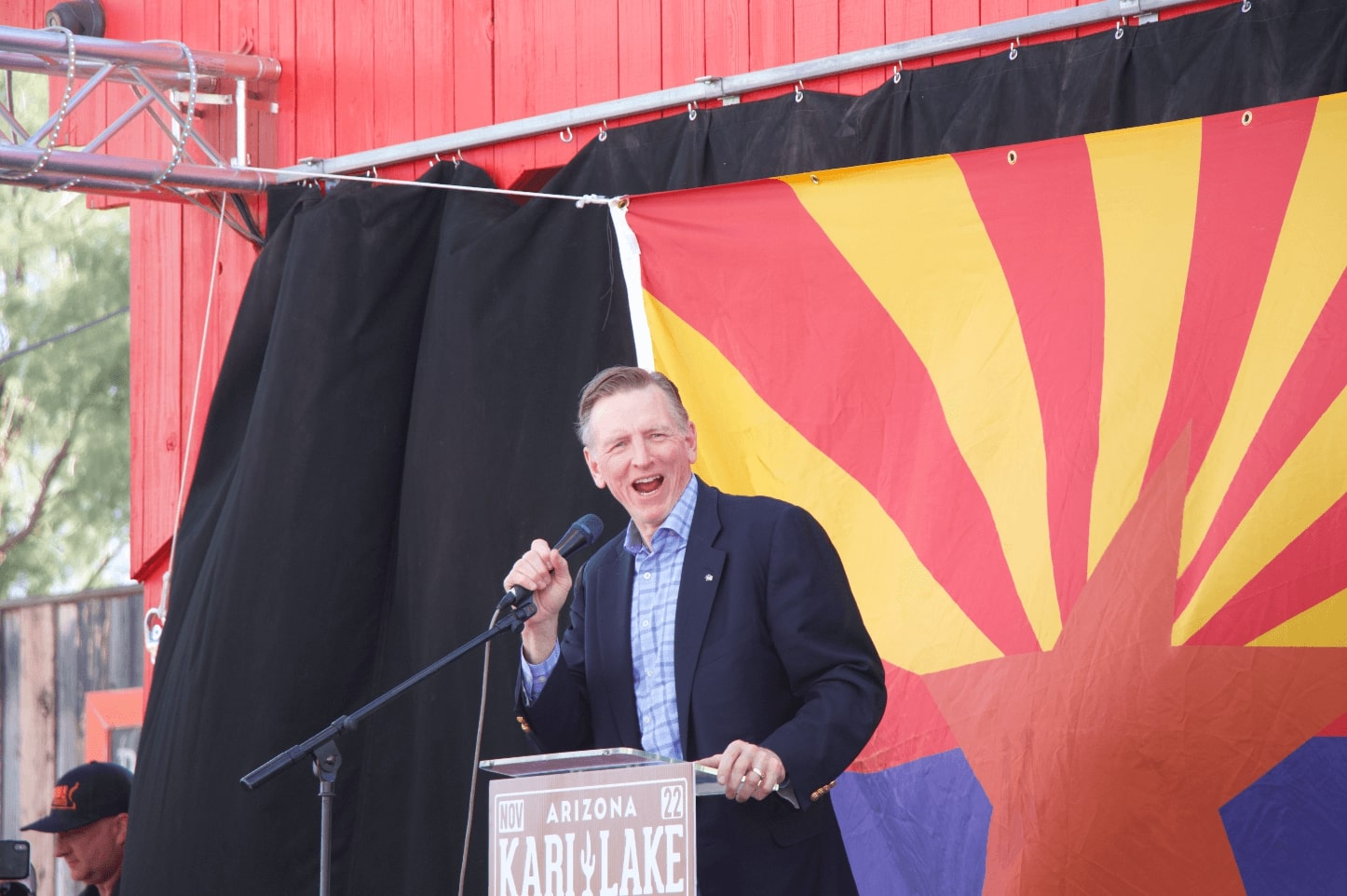PHOENIX (CN) — Attorneys for three Arizona lawmakers tied to the Jan. 6 insurrection at the U.S. Capitol told a Maricopa County judge Wednesday that voter-initiated complaints seeking to disqualify the candidates should be thrown out.
The lawsuits against U.S. Representatives Paul Gosar and Andy Biggs and state Representative Mark Finchem, a Republican from Oro Valley, claim they violated section three of the 14th Amendment, which states no governmental official “shall have engaged in insurrection or rebellion against the same, or given aid or comfort to the enemies thereof.”
Attorneys for the lawmakers argued before Maricopa County Superior Court Judge Christopher Coury on Wednesday.
Arguing before Maricopa County Superior Court Judge Christopher Coury on Wednesday, Gosar's attorney Alexander Kolodin said criminal evidence must be present for the voters to initiate a disqualification based on an insurrection.
“There at least needs to be a crime, and whether or not disqualification can apply in the absence of conviction for insurrection, it simply cannot apply in the absence of the crime itself,” Kolodin said.
There are no criminal charges or cases pending against Gosar, Biggs or Finchem. A U.S. Department of Justice investigation is currently ongoing, but attorneys for the men told Coury that they are unaware of any "congressional" investigation involving their clients.
One associate of Finchem and Biggs is connected to an investigation, however.
The voters who filed the three lawsuits point to Finchem and Gosar’s mutual connection with Ali Alexander, a conservative influencer and right-wing conspiracy theorist, as evidence of their contributory roles in the insurrection. They claim Alexander played a crucial role in coordinating a frenzied demonstration by creating the “Wild Protest,” which sought to gather protesters to demonstrate near the Capitol steps.
Both Gosar and Finchem were scheduled speakers at the event.
Additionally, Alexander has since said that he, Gosar and Biggs “schemed up” the events of Jan. 6 to pressure Republicans during the electoral certification process. Gosar and Biggs hoped to sway then-Vice President Mike Pence into invalidating state-certified election results, according to the complaints against them.
Kolodin told Coury that Gosar’s speech was protected under the incitement test in the U.S. Supreme Court case Brandenburg v. Ohio, which found speech advocating illegal conduct is protected under the First Amendment unless the speech is likely to incite “imminent lawless action.”
“The U.S. Supreme Court has said political speech cannot be enjoined or punished,” Kolodin said. “So, cannot be punished in any way. Incitement requires a direct and imminent threat that is likely to actually lead to immediate violence.”
Kolodin was specifically referring to the voters questioning Gosar’s speech during a meeting with the far-right group known as the Oath Keepers.
Gosar reportedly met with members of the Yavapai County chapter of the Oath Keepers. During the meeting, he was asked if the U.S. was “heading into a civil war,” to which he replied: “We’re in it, we just haven’t started shooting at each other yet.”
The Southern Poverty Law Center described the Oath Keepers as one of the largest far-right antigovernmental groups in the U.S. At least 20 members of the Oath Keepers have been arrested and face criminal charges for their activities on Jan. 6.
Finchem’s attorney Jack Wilenchik used the defenses of GOP lawmakers in similar cases.
He pointed to the last sentence of the disqualification clause to illustrate the duty is of the U.S. Congress, not the courts, to enact the disqualification. Under the clause, Congress can remove a congressperson with a two-thirds vote. “Congress could authorize the manner of its enforcement, and as we sit here today, Congress has not authorized any matter of enforcement other than through a criminal proceeding, and a conviction, which we do not have here,” Wilenchik said.
Wilenchik told the court that the 14th Amendment only aimed to disqualify Civil War-era insurrectionists.
A similar defense was used to dismiss a disqualification attempt against U.S. Representative Madison Cawthorn of North Carolina. After Cawthorn filed an injunction in the federal courts, a judge found that the Amnesty Act of 1872, which pardoned confederates, overruled the Constitution’s 14th Amendment prohibiting “insurrectionists” from Congress.
The attorneys also argued that Arizona should have no say in ballot qualifications for federal candidates since the federal government imposes its standards under Article One, Section Five.
James Barton, an attorney representing the voters, disagreed, citing Roudebush v. Hartke, a 1972 Supreme Court ruling deferring to the states.
“A senatorial candidate was facing a recount and attempted to use the Article One, Section Five defense by saying, well, you can't, you know, subject you to this recount because only the Senate can choose its members,” Barton said. “And the U.S. Supreme Court said no, that happens ultimately after you get through the process within the state.”
Coury did not give an indication of when he would rule. If the lawmakers’ efforts to dismiss are unsuccessful, the court will reconvene for a trial April 25-27.
Subscribe to Closing Arguments
Sign up for new weekly newsletter Closing Arguments to get the latest about ongoing trials, major litigation and hot cases and rulings in courthouses around the U.S. and the world.









